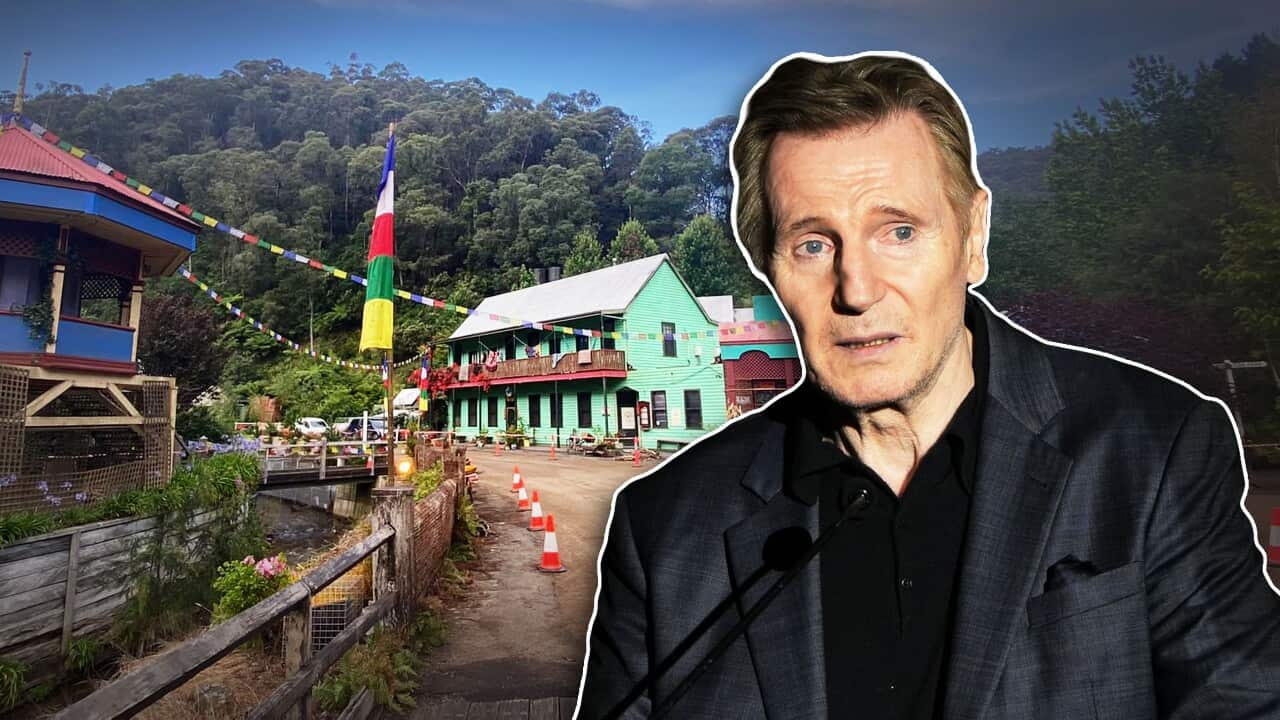Key Points
- Filmmakers Kalani Gacon and Sabin Gnawali are working on their first production together, Home Before Night.
- The shoot of a Hollywood movie starring Liam Neeson in regional Victoria has spurred calls for improvement in Nepal's film industry.
- Cinema plays a vital role in cultural understanding and building interpersonal relations between countries.
Filmmakers Kalani Gacon and Sabin Gnawali forged a connection based on three elements: Australia, Nepal and cinema.
Hailing from the Blue Mountains in Sydney, Gacon has embraced Nepal as his second home, learning the language and cultural intricacies.
Conversely, Gnawali moved down under from Nepal in 2012 for his higher studies and now works in the Australian film industry.
Kalani Gacon (left) and Sabin Gnawali (right) are discussing their new film project, Home Before Night. Source: SBS / Sweksha Karna
"I guess I learned the Nepali language in the working process. And I think because of films, I learned it faster,” he told SBS Nepali.
For my first film, while transcribing, I had to watch the footage and write the words, and I got to learn what is masu [meat], what is khursani [chilli], and what is bhukampa [earthquake].
The filmmakers are working on their first collaboration, Home Before Night, a Nepali film being made in an Australian production setting.
The role of cinema beyond entertainment
Nepal’s Ambassador to Australia, Kailash Raj Pokhrel, said the film industry adds to the bilateral relationship between Nepal and Australia.
He said, over the years, education and tourism have built a bridge between landlocked Nepal and island country Australia, and cinema can play a similar role.
“In the current world, culture, art and cinema are considered as soft power,” he said.
“On a government level, official meetings and visits take place only on a certain time schedule. But cinema builds a people-to-people relationship between countries on a regular basis.”
Walhalla in Victoria has been turned into a replica of a Nepali village for the shoot of Hollywood movie Ice Road 2: Road to the Sky. Source: Facebook / Walhalla
Gippsland’s Walhalla was transformed into a Nepali village as the set for Neeson’s ‘high-octane adventure through Nepal’s treacherous mountainscape’.
The movie takes place in Nepal and is said to feature members from Australia’s Nepali community who worked as extras.
Producer Al Corley said the movie carries a message of upholding cultural significance.
“The whole story is about Liam Neeson trying to save this big corporate entity from destroying this Nepali village by building this dam which will just wipe out their village. And so Vijay, the character in the movie, is trying to save their village from corporate greed. And I think that's a really good message,” Corley said.
“It's a small-town message with big implications. And especially I think for all cultures and even though this is about Nepal, I think it's relatable to cultures all over the world that have their own traditions.”
The Ice Road 2: Road to the Sky team with VicScreen CEO Caroline Pitcher (centre) at Docklands Studios, Melbourne. Credit: SBS Nepali/Dinita Rishal
Navigating cultural differences
Having worked in crews from both countries, Home Before Night creators Gacon and Gnawali find many differences between the two.
"In Nepal, even though you are doing one role, you help out with other roles. It is more casual, but technically, that's not beneficial for the film, and that works for Nepal, but that doesn't happen here [in Australia]," Gnawali said.
"I tried to change that in Nepal, and I failed, I failed miserably. It's a beauty in that casualness and chaos."
Australian filmmaker Kalani Gacon says he is desperate to go back to Nepal. Credit: Kalani Gacon
"One day we were over schedule by three days in one location, and I had a really big fight with the production manager, but he just looked me in my eyes and said, 'this foreign system won't work here',” he said.
"I have tried my best to adopt and adapt the systems of both places to make it work."
Multiculturalism in mainstream movies
Australian-Indian actor Saksham Sharma, who is playing the role of a Nepali villager in Ice Road 2, says he is proud to represent the South Asian diaspora on a major platform.
“When I was shooting in Walhalla, there were a lot of Nepali extras who were there,” he said.
“I spoke to them in their language and it was a very beautiful experience to communicate with people and showcase our cultural diversity on screen which is not as common in a lot of films,” he told SBS Nepali.
Members of the Nepali community worked as extras during the Ice Road 2: Road to the Sky shoot in Walhalla. Credit: Supplied/Amrita Gurung
“Many people wrongly identify us Nepalis as either Mongolian or Indian, based on our appearance. But I think this movie will create some awareness,” she said.
“Since Hollywood movies have a wider audience, I take pride that Nepal has been represented.”
The question asked by many: Why was Ice Road 2 not shot in Nepal?
The movie was shot in Victoria through the federal government’s Location Incentive and the state government’s Victorian Screen Incentive and Regional Location Assistance Fund.
Producer Bart Rosenblatt said the primary reason that attracted the team to Victoria was the tax incentive.
A vehicle painted to resemble buses in Nepal. Source: Facebook / Walhalla
“You have a lot of infrastructure needs on a movie like this. So, the combination of the infrastructure in Nepal not being what it is in Australia, and the tax credit, brought us here.”
Producer Corley said that some parts of the movie have also been shot in Nepal to capture the realism.
Nepali movie industry
Home Before Night producer Gnawali said Nepal should also come up with financial incentives.
"I think Nepal should also think of introducing tax incentives like Australia, which might allow international productions opportunities to work in Nepal," he said.
Queensland-based media and communications academic Bharat Raj Poudel urged Nepal to create safe and managed environments for foreign film productions.
“There are many pristine natural landscapes in Nepal, many of which have been featured in many old Indian movies and international documentaries,” he said.
“While Nepal might not be able to provide millions in tax incentives as Australia, it should focus on creating a welcoming environment to international film productions, and simplify the complex administrative processes.”











